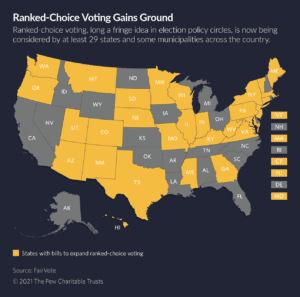Ranked-Choice Voting: A Curiosity or Coming Reform?
September 6, 2022

In August, Democrat Mary Peltola won Alaska’s lone seat in the House of Representatives in a special election to replace Don Young (R), who passed away in March 2022.1 Peltola defeated two Republicans, former Governor Sarah Palin and Nick Begich III. Peltola becomes the first Alaska Native person to be elected to Congress.2
This election received national attention for multiple reasons. First, Palin is a well-known figure in national politics and was the 2008 vice-presidential nominee for her party. Second, a Democrat winning in Alaska is often newsworthy. However, what most captured public attention in this special election was Alaska’s use of ranked-choice voting.
What is Ranked-Choice Voting?
Ranked-choice voting is a system in which voters rank candidates by preference. If a candidate wins a majority of first-preference votes, they are declared the winner. If no one wins a majority of first-preference votes, the candidate with the fewest first-preference votes is eliminated. First-preference votes cast for the failed candidate are eliminated, lifting the second-preference choices indicated on those ballots. A new tally is conducted to determine whether any candidate has won a majority of the adjusted votes. This continues until a candidate wins an outright majority.
In the Alaska special election, Peltola secured the most first-place votes (39.7 percent), but not enough to win an outright victory. Palin came in second (30.9 percent), so the first-place votes of Begich and those who had opted for a write-in candidate were eliminated. While most Begich voters ranked Palin as their second choice, enough of them put Peltola as second to put her over the 50-percent threshold.4
Should More States Adopt Ranked-Choice Voting?
Alaska is the second state to adopt ranked-choice voting; Maine also adopted the system in 2016. New York City elected to adopt ranked-choice voting in 2019.5 Several other cities, including San Francisco, Oakland, Minneapolis, and St. Paul, have used the system for several years.6
Advocates of ranked-choice voting argue that it will lead to less partisanship and will reduce negative campaigning and attack ads.7 Indeed, in Alaska, Palin and Peltola did not engage in much negative campaigning against each other.8
However, there are also arguments against ranked choice voting. Critics argue that ranked-choice voting is confusing and that voters are overwhelmed by the task of ranking all candidates rather than just choosing one. For example, Senator Tom Cotton (R-Ark.) wrote on Twitter: “Ranked-choice voting is a scam to rig elections. 60% of Alaska voters voted for a Republican, but thanks to a convoluted process and ballot exhaustion—which disenfranchises voters—a Democrat ‘won.'”9
Some critics also argue that the second-choice votes of the top candidates should count for something. In other words, in the Alaska election, people who voted for Palin or Peltola with their first-choice votes never had their second-choice votes counted.10
Advocates, who are often a mixture of centrists and far-left progressives who dislike the mainstream Democratic Party,11 also argue that ranked-choice voting might lessen the impact of dark money and corporate spending on elections. In Alaska, Palin outspent Peltola by 400 percent and Begich outspent both of them, only to come in third.12
Lawmakers in 29 states are now considering ranked-choice voting.13 Andrew Yang, a former presidential candidate and the founder of the Forward Party, argues that ”ranked choice voting ensures the most accurate allocation of delegates based on voters’ true preferences.”14 Ranked-choice voting is the central focus of the new party that Yang and others launched recently.
SEE : Is Your State Considering Ranked-Choice Voting?
: Is Your State Considering Ranked-Choice Voting?
In recent election cycles, voters and candidates have focused on the political and electoral process almost as much as the issues themselves. There have been arguments about voter ID laws, mail-in voting, the Electoral College, and campaign finance laws, to name just a few issues. It is possible that reforms in elections such as ranked-choice voting will continue to be prominent in U.S. political debates for some time.
Discussion Questions
- Do you believe the U.S. election system functions well to represent the views of the people? Why or why not?
- What reforms to U.S. elections, if any, would you like to see?
- Are you for or against ranked-choice voting? Why or why not?
As always, we encourage you to join the discussion with your comments or questions below.
Sources
Featured Image Credit: AP Photo/Becky Bohrer
[1] CBS News: https://www.cbsnews.com/news/alaska-house-results-mary-peltola-democrat-wins-sarah-palin/
[2] Alaska Public Media: https://alaskapublic.org/2022/08/31/mary-peltola-wins-alaskas-special-u-s-house-race/
[3] The Hill: https://thehill.com/homenews/campaign/3624697-peltola-defends-ranked-choice-voting-after-defeating-palin-in-alaska/
[4] Reuters: https://www.reuters.com/world/us/how-alaskas-new-voting-system-helped-deliver-historic-win-us-democrats-2022-09-01/
[5] Time: https://time.com/5718941/ranked-choice-voting/
[6] Vox: https://www.vox.com/22443775/ranked-choice-voting-explained-new-york-strategy
[7] Ibid.
[8] NPR: https://www.npr.org/2022/08/31/1120327126/palin-peltola-begich-alaska-special-house-election-results
[9] NBC News: https://www.nbcnews.com/politics/2022-election/sarah-palins-election-loss-sen-tom-cotton-calls-ranked-choice-voting-s-rcna45834
[10] National Review: https://www.nationalreview.com/corner/the-problem-of-transparency-in-ranked-choice-voting/
[11] Vox: https://www.vox.com/22443775/ranked-choice-voting-explained-new-york-strategy
[12] Open Secrets: https://www.opensecrets.org/news/2022/09/mary-peltola-beats-well-funded-republican-opponents-in-special-election-for-alasaka-house-seat
[13] Pew Research: https://www.pewtrusts.org/en/research-and-analysis/blogs/stateline/2021/03/12/ranked-choice-voting-gains-momentum-nationwide
[14] USA Today: https://www.usatoday.com/story/opinion/2020/10/02/why-ranked-choice-voting-improve-american-elections-yang-weld-column/5877731002/








Tom was wrong.
https://www.statesman.com/story/news/politics/politifact/2022/09/07/fact-check-tom-cotton-claim-alaska-ranked-choice-voting/65474710007/
Just a FYI, Arkansas uses Ranked Choice Voting for Military and Overseas voters so that Military and Overseas voters can rank their choices in case of a runoff election. So Senator Tom Cotton’s own state uses RCV without any issues of voter confusion, exhausted ballots, vote rigging, etc.
“MILITARY AND OVERSEAS VOTERS IN RUNOFFS
Arkansas: Adopted in 2005. First used in 2006. Extended to all local runoffs in 2007.”
https://fairvote.org/our-reforms/ranked-choice-voting-information/#military-and-overseas-voters-in-runoffs